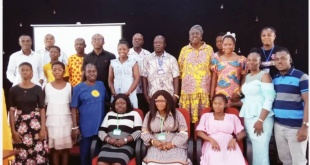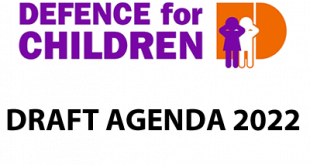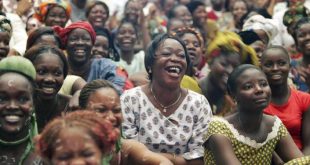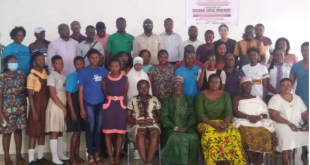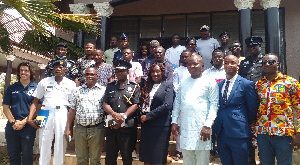The Committee on the Rights of the Child today concluded its consideration of the combined third to fifth periodic report of Ghana on its implementation of the provisions of the Convention on the Rights of the Child.
Presenting the report, Nan Oye Lithur, Minister for Gender, Children and Social Protection of Ghana, said Ghana made history on 5 February 1990 by being the first country to ratify the Convention on the Rights of the Child. Since then it had strived to improve the welfare of children through legal, policy and institutional mechanisms. Ghana had made good progress in reducing childhood poverty and was the first country in sub-Saharan Africa to achieve Millennium Development Goal 1 on halving the population living in extreme poverty. Birth registration had increased from 17 per cent in 2002 to 66 per cent in 2013. More children were in school, especially girls. Vaccination coverage was now 98.3 per cent and the prevalence of HIV/AIDS had been reduced by 25 per cent. Child labour, especially in the mining sector, remained a challenge but progress was being made. Efforts to eliminate harmful traditional practices included closing down witch camps and criminalizing female genital mutilation. The Government was acting in response to the nationwide increase in early and forced marriage which was primarily due to poverty.
In the discussion Committee Experts commended Ghana for its legislative reform and new laws to promote and protect children’s rights. They expressed concern about harmful traditional practices of female genital mutilation, the holding of women and children in witch camps, and the practice of Trokosi (the giving of young girls to religious shrines for a lifetime of forced ritual servitude), despite the existence of laws prohibiting them. The increase in early and forced child marriage was also discussed. Experts asked about a range of health issues such as neonatal, antenatal and maternal healthcare, immunization campaigns and HIV/AIDS. The growth of private schools and unqualified teachers was a pressing issue, said Experts, who also asked about the treatment of children with intellectual and other disabilities. Ghana was commended for increasing birth registration and asked about support for families in rural areas, children in street situations and the use of corporal punishment.
In concluding remarks, Amal Aldoseri, Committee Member acting as Rapporteur for the report of Ghana, said it was obvious that a lot had been done over the last decade to realize the rights of the child in Ghana but much more needed to be done, including tackling discrimination against vulnerable groups and improving the quality of education provided by private schools.
In concluding remarks, Benyam Dawit Mezmur, Chairperson of the Committee and Rapporteur for the report of Ghana, appreciated the multi-sectorial composition of the delegation and urged Ghana to focus on issues of budgeting, prioritization, and collaboration between the various ministries and stakeholders.
In concluding remarks, Ms. Lithur expressed great appreciation for the work of the Committee and other stakeholders, including civil society organizations and development partners, many of whom had watched the discussion in Ghana via the live webcast. Ghana was the first county to ratify the Convention and so a lot was expected from it.
The delegation of Ghana included the Minister for Gender, Children and Social Protection and representatives of the Ministry of Education, Maternal and Child Health Unit, Ghana Police Service, Parliamentary Select Committee, Department of Children, Department of Social Development, Human Trafficking Secretariat and the Permanent Mission of Ghana to the United Nations Office at Geneva. The delegation also included representatives of the following non-governmental and media organizations: Child Rights International, NGO Coalition on the Rights of the Child, Human Rights Advocacy Centre, UNIQ Radio/Curious Minds, Daily Graphic newspaper, Ghana News Agency, Radio Gold, Peace FM radio, Gray Weston Media and United Television.
The Committee will next meet in public at 3 p.m. today (Chamber B) to conclude its review of the reports of Honduras under the Convention and under the Optional Protocol to the Convention on the Rights of the Child on the sale of children child prostitution and child pornography (CRC/C/OPSC/HND/1) and the Optional Protocol to the Convention on the Rights of the Child on the involvement of children in armed conflict (CRC/C/OPAC/HND/1). The programme of work for the Committee’s sixty-ninth session can be found here.
Report
The combined third to fifth periodic report of Ghana can be read here: CRC/C/GHA/3-5
Presentation of the Report
NAN OYE LITHUR, Minister for Gender, Children and Social Protection of Ghana, said Ghana made history on 5 February 1990 by being the first country to ratify the Convention on the Rights of the Child. Since then, guided by the 1992 constitution and the 1998 Children’s Act, Ghana had strived to improve the welfare of children through legal, policy and institutional mechanisms. Protective legislation for children included the 2003 Juvenile Justice Act, the 2005 Human Trafficking Act and the 2006 Disability Act. The Child and Family Welfare Policy was adopted in February this year and a Justice for Children Policy was expected to be adopted in June 2015. The Commission for Human Rights and Administrative Justice had a Children’s Unit which monitored the implementation of children’s rights. Interventions were prioritized for the most vulnerable children, including girls, children with disabilities, children of asylum seekers, refugee children and children of immigrants, children exposed to sexual and gender-based violence, children with HIV/AIDS and children living or working on the streets.
Ghana had made good progress in reducing childhood poverty and was the first country in sub-Saharan Africa to achieve Millennium Development Goal 1 on halving the population living in extreme poverty. Birth registration had grown from 17 per cent in 2002 to 66 per cent in 2013 as a result of measures including free registration of babies within twelve months of delivery. Nearly one in five children in Ghana was educated in a private school and the Government continued to encourage the participation of the private sector in education delivery. To ensure no child was denied access to a basic education, school uniforms and books were provided to the most needy for free and the Ghana School Feeding Programme fed more than 1.6 million pupils with a hot nutritious meal every day, increasing school enrolment by 80 per cent. To bridge the gender gap in schools the Girls’ Education Unit worked to remove barriers, for example by providing scholarships.
The Ghana Health Service was a community-based service that strove to improve the nutritional status of children by improving maternal nutrition and capacity building of health staff. Vaccination coverage was now 98.3 per cent and the prevalence of HIV/AIDS in Ghana had decreased by 25 per cent between 2001 and 2011. Prevention of mother-to-child transmission services had been integrated into sexual and reproductive health services, while in 2012 70 per cent of all HIV-positive pregnant women received anti-retroviral medication. The most prevalent disabilities in Ghana were mobility, sight, speech and hearing difficulties, and there were 445 registered children with disabilities at the end of 2013.
Efforts to eliminate harmful traditional practices included closing down of the Bonyase witch camp and freeing its inmates of women and children, and convening the National Conference on Witchcraft Accusations in Accra in 2014 to develop a national consensus on the underlying issues surrounding witchcraft accusations and to chart a way forward to eliminating the practice. Female genital mutilation was prohibited by law, a criminal act with a minimum punishment of five years imprisonment, and sexual exploitation was also a criminal offence. Early and forced marriage was increasing nationwide, from 25.9 per cent in 2006 to 27 per cent in 2011, an increase that may be because poverty compelled parents to give their girl children away in marriage. Child labour remained a challenge in Ghana, particularly in the mining sector, and a national plan of action had been created to address it. While Ghana faced financial, human and material resources it was committed to fulfilling its obligations under the Convention and was grateful for the political commitment and support provided by all stakeholders, including civil society organizations and development partners.
Questions by the Experts
AMAL ALDOSERI, Committee Member acting as Country Rapporteur for the report of Ghana, commended Ghana for the progress it had made and also for acknowledging the modesty of its achievements during the reporting period. Ghana was also commended for ratifying several international treaties including the Optional Protocol to the Convention on the Rights of the Child and the Convention on the Rights of Persons with Disabilities. There had been notable reform of national legislation in response to the provisions of the Convention and new laws had been adopted on subjects including trafficking, disabilities and domestic violence, she noted.
Trokosi, female genital mutilation and domestic violence were all on the increase despite the existence of laws prohibiting them. The Committee was concerned that corporal punishment was allowed by law if it was “justifiable and reasonable”.
Discrimination was prohibited by law but social practices continued to discriminate against the usual vulnerable groups: girls, children with disabilities, asylum seekers, children in street situations, and those affected by HIV/AIDS. What had been done in particular to address discrimination against girls, had there been any training of religions and community leaders in an effort to combat negative stereotypes and practices?
BENYAM DAWIT MEZMUR, Chairperson of the Committee and Country Rapporteur for the report of Ghana, welcomed progress made in birth registration but expressed concern that only children born in Ghana who had one Ghanese parent were eligible for Ghanese nationality. Awareness-raising efforts to promote birth registration were welcomed by Mr. Mezmur who asked how rural communities were reached and what happened to babies who missed the deadline for free registration. What was the Government doing to combat corruption in the birth registration process?
The issue of violence against children was a big challenge and the Committee welcomed the State party’s recognition of it and the efforts it was making in response. The Domestic Violence Victim Unit within the Police Force, the Board and the Fund for victims were also welcome initiatives, said Mr. Mezmur, asking what impact they had had so far.
The initiatives to end child marriage were commendable but despite their establishment the number of forced and early marriages in Ghana was increasing. What was the Government doing in response? The law prohibited marriage for persons under the age of 18 years but were there any exceptions? If children were married did they then continue to be considered as children, or would they be considered as adults?
Ghana was congratulated for its efforts to combat traditional practices such as Trokosi, female genital mutilation, scarring and accusations of witchcraft, and for bringing together all the tribal and religious leaders to tackle them. The Expert asked for more information on those efforts and how religious leaders and personnel in particular were engaged. Trokosi, a form of ritual servitude in religious shrines, usually of young virgin girls, was criminalized by law, he noted and asked the delegation to elaborate on the challenges it faced in implementing the law, gaps in practice and the application of the sentence.
Response by the Delegation
Harmful traditional practices such as Trokosi, female genital mutilation, scarring, accusations of witchcraft and widowhood practices were very sensitive social and cultural practices which had existed for decades, or even centuries. Although they were all criminalized some of those practices continued unabated and it was difficult to use legal mechanisms to protect women and children from them. There had been some achievements – for example the prevalence of female genital mutilation been reduced from 30 to four per cent over the last 10 years. Six people had been convicted for carrying out female genital mutilation.
Trokosi was a form of ritual servitude which involved families giving up young virgin girls to serve in shrines so they could atone for the sins of their relatives. The girls had to spend their entire lives in the shrines, growing up there and being forced to stay until they died. Trokosi mainly occurred in the Volta region and certain parts of the Accra region. It was criminalized in 1998 but the problem was changing social attitudes. It had been extremely difficult to secure prosecutions or convictions of people practicing Trokosi, and not one person had yet formally filed a complaint with the courts. In one area a Trokosi shrine was located on the same street as a police station but the police had not been able to intervene, which showed how strong the cultural and social pressures were. The Government and non-governmental organizations, in particular the International Needs Network, were actively working to negotiate with shrine owners and traditional leaders to persuade them to use alternative symbolic practices, and with the families to persuade them not to give their girls up. It was difficult to close down the shrines and the focus was instead on freeing the girls who were kept there.
Efforts to combat accusations of witchcraft and the imprisonment of women in witch camps were ongoing, explained a delegate, as seen in the closing down of the Bonyase witch camp in the Northern Region on 15 December 2014 where 150 girl children had been held. The focus was on preventing the women and girls who were accused of being witches from being lynched by their communities, freeing them from the witch camps, providing them with humanitarian assistance and helping them reintegrate into communities.
The practice of female genital mutilation was most prevalent in the north and upper eastern regions of Ghana, especially in the areas bordering Togo and Burkina Faso where female genital mutilation was still legal. Female genital mutilation had been carried out for centuries although it had no religious or cultural standing and many men in those regions often said they had no idea why it was necessary. Although female genital mutilation was illegal in Ghana families would simply take their children over the border into Togo and Burkina Faso to carry it out. African women and mothers had been culturally tarred in such a way that they feared the consequences of speaking out and reporting cases, said a delegate, and similarly children were also scared to report it. The answer was to change mindsets and attitudes and give women the confidence to report and take action, said the delegate.
Birth registration was decentralized and Birth and Death Registry Offices were located in each of the 216 districts across Ghana. A child could be registered at any time; advocacy activities included the promotion of Birth Registration Day every September and Child Health Promotion week every May. Registration was free for the first year of a child’s life. Children born in refugee camps were registered by community nurses. Traditional birth attendants working in the most remote areas had been trained to record births so certificates could be issued at a later date when a community nurse visited the family. Abandoned children were usually registered when they were admitted into an orphanage. Birth certificates were necessary to enrol children into school which was an incentive for parents to register their children. An unregistered child would still be allowed to enrol at school but their parents would be obliged to attend the Birth and Deaths Office to do a late registration. The fee for birth certificates was very minimal, usually two or three cents, so it was difficult to see how there could be corruption.
Each of the 216 districts in Ghana had a human rights and administrative justice office to which people could submit complaints. Those offices also managed awareness-raising programmes, including on children’s rights, in schools and community places. The district offices reported to the 10 regional offices which in turn reported to the headquarters.
To tackle early and forced marriage, the Government had, in partnership with the United Nations Children’s Fund, set up an Anti-Child Marriage Coordinating Unit which was developing factsheets, training packets and resource guides, providing regular updates on social networking platforms on child marriage and establishing a committee of experts to advise it. Child victims of forced marriage could seek help from a shelter established in the Greater Accra area. Even if they married children remained children in the eyes of the law until they reached 18 years of age. The age of sexual consent in Ghana was 16 years but the age of marriage was 18 years, which was a problem because if a child had sex at 16 and got pregnant, then they should get married. However the Government remained firm that it would not reduce the marriage age to 16 years. Sometimes mothers accepted gifts or money from wealthy men and in turn promised to give them their daughters. A very active non-governmental organization on the matter was Action Aid which had rescued hundreds of girls and sent them back to school.
On the prosecution of cases of abuse against children, a delegate said although Ghana was currently developing a sentencing policy, the Criminal Offences Act, amended in 1998, contained minimum sentences, such as seven years for defilement and seven years for using children in prostitution. A worrying development was the increase in sexual offences against children being settled out of court.
The police managed a national database on domestic violence against children which contained gender-disaggregated statistics on sexual abuse of children, including rape, incest, defilement and increasingly sodomy against young boys. It also contained data on perpetrators and victims. The Government took a multi-sectoral approach to tackling violence against children, custody and maintenance matters, and over 90 units across the country were attached to police stations, staffed by social workers and psycho-social experts.
Questions from the Experts
The Committee had received reports that children with intellectual disabilities were victims of multiple forms of discrimination and often cast out by their families and communities. The children were usually confined in psychiatric institutions and so-called “prayer camps” where they were subjected to inhumane and cruel treatment, often due to religious beliefs. They did not have access to education. What alternative measures existed for children with intellectual disabilities to live in a community or family-type environment and receive the necessary support.
The increase in private education in Ghana was a pressing issue. The past decade had seen an unprecedented increase of private primary schools, which had almost doubled in the last five years. The statistics available were only the registered schools, and together with unregistered schools the number was much higher. Parents were obliged to sacrifice a lot of money to enrol their children in private schools to avoid the poor performance of State schools. This widened the already existing socio-economic disparities in the Ghanaian society. The Expert also asked about the reasons for the low quality of public education, the lack of teachers and teacher absenteeism.
The delegation was asked for information on the access to quality health systems for children. The neo-natal mortality rate was very high and a serious concern. The maternal mortality rates remained high, including for pregnant adolescents. The reported decline in exclusive breastfeeding was a concern, and could be related to a lack of breastfeeding promotion and a large number of breast milk substitutes on the market. The Expert asked for information about measures taken to reduce the number of children suffering from stunting and malnutrition.
Adoption and fostering were enquired about by an Expert who expressed concern about the extremely low number of children fostered – just 12 last year – and the high number of children placed for adoption. He asked for clear statistics on national and international adoption and asked how Ghana supported family-based alternative care. Illegal adoption was a form of trafficking of children, he commented, asking about plans to deal with irregular inter-country adoption.
The Committee was concerned by the high incidence of teenage pregnancies and the high number of illegal and unsafe abortions for adolescents. What was the Government doing to improve sexual and reproductive health care for adolescents? The Expert also asked how the issue of drug and substance abuse in high schools was addressed.
Other questions on the area of health included whether there was a brain-drain of trained health personnel from Ghana, subsidies for caesarean sections and consequent need for blood transfusions, and the need to synchronize vaccination campaigns with neighbouring countries. An Expert also asked about the use of mosquito nets in rural areas and measures to eradicate Guinea-worm disease.
A large number of children were still involved in child labour, said an Expert, asking what measures had been taken to eradicate the worst forms of child labour, including in mining, quarrying, fisheries and commercial sexual exploitation, and to prosecute businesses – particularly mines – which used child labour.
How were street children supported and what was being done to tackle the root causes of children in a street situation? Ghana was commended for its work to support asylum-seeking and refugee children by an Expert who asked about ways to strengthen programmes for them, and to care for unaccompanied minors.
The juvenile justice system was raised by an Expert who asked what sort of cases went to the juvenile courts. He expressed concern that children were still being detained in adult prisons and asked why it was necessary to hold a high number of juveniles in pre-trial detention. He asked about out-of-court settlements and the use of traditional justice systems.
Response by the Delegation
On the subject of juvenile justice a delegate informed the Committee that a study on children in the criminal justice system to gather disaggregated data was concluded at the end of 2014. A report based on that study would be sent to the Cabinet by the end of June and consequently it was hoped that a new juvenile justice policy would be adopted by the end of 2015. The most recent data available showed that at the end of 2013, 59 children aged 12 to 17 years of age were held in correctional facilities managed by the Ghana Prison Service. The study identified that 1.2 in every 100,000 children were held in pre-trial detention and at the end of 2013 72 children were held in pre-trial detention. Of those 72 cases, court proceedings had been started for 22 cases and the other 50 children had been charged with an offence.
In a follow-up question, an Expert asked why children were kept in pre-trial detention, whether they were separated from adults, how long they could be held on remand and whether their cases were fast-tracked. The State party’s own legislation stated that children should not be held in pre-trial detention unless they posed “a serious danger to the community”, the Expert commented.
Children were held in pre-trial detention when they were charged with grave offences such as defilement and other sexual offences and stealing in aggravated circumstances, such as armed robbery. Sexual offences and robbery were classified as non-bailable offences, confirmed the delegate. Additionally, children were sometimes held in remand homes for their own safety because they risked being victims of retributive acts. Children were kept in special remand homes and were separated from adults. The Juvenile Justice Act specified that any court case involving a child had to be completed within six months and that was the maximum period that a child could be held in pre-trial detention.
The forthcoming amendment to the Refugee Bill would have an expanded mandate that addressed all issues relating to asylum seekers and refugees and included a new definition of “family” to encompass children. The amendment would provide better protection to refugee and asylum-seeking children and speed up their registration processes. In February 2015 Ghana joined Benin, Liberia and Sierra Leone in signing an Economic Community of West African States (ECOWAS) declaration pledging to end statelessness and committing to sign the two international conventions on statelessness.
Turning to child labour the Committee was informed that Ghana recently underwent a peer-review by the Economic Community of West African States (ECOWAS) mechanism which identified gaps in its national plan of action on child labour. Consequently consultations to amend the plan and make it more responsive were underway. To date more than 2,000 children had been rescued from working in the mining industry, and last year alone 300 families received livelihood support to discourage them from sending their children to work in mines. Community-based child protection teams had been established within mining communities which had led to the withdrawal last year of more than 267 children from mining activities.
There were at least 18,000 street children in Ghana of whom 90 per cent were girls and 10 per cent boys, while 51 per cent of street children came from one particular ethnic group. The problem was clearly linked to poverty and girls from the north fleeing early and child marriages. In response a short-term and a long-term plan had been drawn up by the Parliament. One response had been the offering of a range of immediate humanitarian and health services to street girls in major market places in the capital city Accra and other large cities. Other interventions targeted communities in the northern regions of Ghana, such as the provision of cash transfers to pregnant women and women with children aged two years or less and other efforts, such as the provision of education and skill-building training to prevent the exodus of young girls from the north to the urban areas. The Association of Street Children gave out scholarship packages to girls to enable them to go back to school.
The maternal mortality rate remained persistently high, said a delegate, which had led to the policy of free antenatal and delivery care for all women in Ghana. The result was high coverage, with 97 per cent of pregnant women receiving antenatal care and 74 per cent of births being attended by a skilled birth attendant. One consequence had been a shortage of staff and health facilities because more women were coming into health facilities to receive antenatal care and deliver their babies. In response the Government was training midwives who could travel and provide midwifery services at the community level, especially in the most remote areas. Physicians and technicians were also being trained, in particular to address issues such as post-partum haemorrhage which was a leading cause of maternal mortality. The delegate described a pilot project to provide pregnant women who planned to give birth at home with an anti-haemorrhage medication, that did not need to be refrigerated and which they could keep at home in case they needed it during the birth. Caesarean sections were subsidised and blood transfusions were covered by the national health insurance scheme. Pregnant women were asked to identify people who would donate blood for them ahead of the birth in case they needed a blood transfusion.
Teenage pregnancy was a concern said a delegate, and like all pregnant women teenage girls had free access to antenatal care but sometimes they did not take it up. In response the Government was training health providers to not discriminate against pregnant adolescents in need of antenatal care and urging health clinics to offer adolescent-friendly services outside of peak hours. To reduce the neo-natal mortality rate a new-born Sub-Committee was established in 2012 which brought together stakeholders, including medical staff, technicians and community health workers, to devise and launch a national action plan spanning the period 2014 to 2018.
Between 2006 and 2011 breastfeeding rates had unfortunately dropped from 63 to 47 per cent for children up to six months of age. In response the baby-friendly hospital initiative had been strengthened and pro-breastfeeding campaigns intensified. The number of advertisements for breast-milk alternatives such as infant formula had been reduced but the influence that manufacturers of breast milk had over health practioners, particularly by convening seminars and conferences, was a concern. The delegate said she was happy to note that the breastfeeding rate was slowly rising and was currently at 50 per cent.
For many years national immunization days, for example for Polio, had been synchronized with neighbouring countries across the sub-region. The Government would consider synchronizing regular immunization services in the same way. A delegate noted that vaccinations were also made available for foreign nationals, especially in border towns. The delegate also noted that families were encouraged and assisted in using anti-mosquito bed nets by health professionals.
Ghana had a sharp geographical division in the field of education between the north and south, with school attendance – especially for the girl child – at its lowest in the northern regions. For the last 15 years the Government had been taking measures to close that gap and some achievements had been seen. The gender gap in education was taken equally seriously, especially the significant drop-out rate of girl pupils at the senior school level in order to work to support their families. In response the authorities provided incentives to attend school such as a daily hot meal for all pupils, scholarships and other forms of support. There was also a nine-month fast-track programme to get children aged between seven to 15 years who dropped-out back into school.
To support children who dropped out of school aged 15 years and above the Government in 2007 launched the National Apprenticeship Programme. Under that formal and well-structured competency-based programme children were taught a trade by over 1,200 master craftsmen in fields such as electronics, automobiles and construction.
Around 27 per cent of schools in Ghana were private schools, said a delegate, and Ghana was dedicated to supporting the private sector in education but emphasized that private schools had to provide quality education. Although it was difficult to collect statistics from private schools which were often unwilling to share data with the authorities the Government was working hard to bring them up to standard. The Government was aware that poor families often needed support to send their children to school and although primary education was free it had for many years provided a subsidy to families and provided poor pupils with free uniforms and school books. Realizing that the existing education subsidy was too small the grant had been recently increased, noted a delegate.
Great efforts were being made to train teachers and in particular encourage people to undertake a diploma in teaching. Courses had been enthusiastically taken up especially by rural teachers, and in-school training was also popular. To improve ICT in education 60,000 laptops had been provided to Basic Schools in all 10 regions of Ghana under the Basic School Computerization Programme, while 50,000 teachers had benefitted from ICT training. Corporal punishment was generally forbidden in schools and could only be applied if a head teacher gave permission to a teacher to use the cane; then the reason for the punishment and the number of strokes given had to be logged in the official record. The Child and Family Welfare policy, apart from establishing a new child protection system, also addressed violence against children, including corporal punishment. That policy recommended the law contained in the Children’s Act be amended over the next three years to prohibit the use of corporal punishment as a form of violence against children.
The Care Reform Initiative was launched in 2007 to ensure children grew up in a family setting rather than in an institution. The initiative included training for orphanage staff, including on reunification processes, and support for families to keep their children in the first place. The number of Ghanaian children adopted outside the country had decreased drastically and in the first quarter of 2015 only one inter-country adoption had been approved, which was for a Ghanaian family living abroad. Since 2010 2,248 children had been reunited with their families and 83 orphanages had been closed down. The authorities were trying to collect information on the number of children who were living with their relatives under the ‘kinship care’ scheme, which was not a form of adoption and sometimes confused as a form of foster care. The Government wanted children who were not living with their own parents, even if they were with extended family, to be registered and well care for.
In follow-up questions, an Expert asked for a clarification on corporal punishment, about what was being done to tackle commercial sexual exploitation and about trafficking of children in general.
A delegate said in actuality the prevalence of female genital mutilation had been reduced from a rate of 30 per cent before 2000 to less than four per cent today. She also confirmed that today Ghana was free of Guinea-worm disease, as certified by the World Health Organization.
The Government was committed to addressing the issue of unsafe abortion which was the second leading cause of maternal mortality in Ghana. The law was amended in 1987 to be more liberal and a comprehensive abortion care strategy was in place. The World Health Organization guidelines on comprehensive abortion care were followed and used for the training of staff. Abortion was permitted in cases of rape and defilement, for physical and mental reasons and where there was a substantial risk to the mother. Any woman could walk into a Government health facility and have a termination if she came under those grounds.
Commercial sex work involving young girls was an issue of concern, said a delegate, although sexual exploitation and prostitution were criminal acts in Ghana, and any person who procured a child for the purposes of prostitution could be prosecuted. Research carried out by the United Nations Population Fund (UNFPA) into commercial sex work involving children found that 57 per cent of children interviewed had engaged in commercial sex work without using condoms. The Ghanaian Police Force had taken up that research and was working with civil society organizations such as Marie Stopes International to combat the problem and related reproductive health issues, starting on the coastal belt of Ghana. The Trafficking and Abuse Fund was operational, she added.
The Head of Delegation noted that all the data referred to in the dialogue would be provided to the Committee along with the responses to questions it had been unable to answer due to time constraints.
Concluding Remarks
AMAL ALDOSERI, Committee Member acting as Rapporteur for the report of Ghana, thanked the delegation for their candid and detailed answers and their cooperation with the Committee. It was obvious that a lot had been done over the last decade to realize the rights of the child in Ghana. However, much more needed to be done, said Ms. Aldoseri, highlighting in particular discrimination against vulnerable groups and the quality of education provided by private schools.
NAN OYE LITHUR, Minister for Gender, Children and Social Protection of Ghana, said on behalf of the people of Ghana they greatly appreciated the work of the Committee and other stakeholders, including civil society organizations and development partners, many of whom had watched the discussion from Ghana via the live webcast. Ghana was the first county to ratify the Convention and so a lot was expected from it. Ghana was committed to realizing, respecting and protecting the rights of its children and would look forward to the Committee’s concluding observations which in particular would help it focus on the implementation of the Convention.
BENYAM DAWIT MEZMUR, Chairperson of the Committee and Rapporteur for the report of Ghana, agreed with Ms. Aldoseri that much work had been done but issues of budgeting, prioritization, and collaboration between the various ministries and stakeholders had to be focused on. Mr. Mezmur also appreciated the multi-sectorial composition of the delegation of Ghana.
For use of the information media; not an official record
 DCI-GHANA Defence for Children Internation
DCI-GHANA Defence for Children Internation
